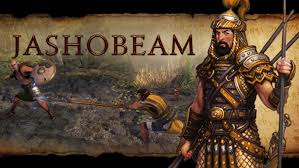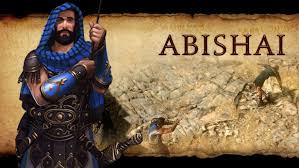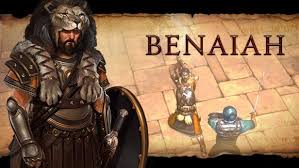David’s Mighty Warriors
Second Samuel 23:8-39
and First Chronicles 11:10-47
David’s Mighty Warriors DIG: This is David’s hall of fame. What kind of people do you imagine the typical mighty man of David was? Who should get the credit for their victories? When in David’s lifetime do you think the event of Second Samuel 23:13-17 occurred? For what was Abishai famous? Why do you think he was commander of The Three, but not among them? For what was Benaiah famous? How was he honored? What names do you recognize among the Thirty? What biblical events bring their names to mind for you?
REFLECT: Take a sample cross-section of 100 believers in the LORD’s spiritual army. Would you place yourself in the top 30? 40? 50? Why? What strengths would you need to develop to be among the King’s mighty spiritual warriors? Where YHVH has placed you now, what would it mean for you to “stand your ground”? What major obstacles or opposition would you be able to strike down with the help of ADONAI? In the near future, in what battle of yours would you like to see God give you the victory? Do you feel like you are fighting any battles all by yourself? How can you pray?486
The last four chapters of Second Samuel serve as an appendix to David’s career. These events occurred earlier in the king’s life but are presented here to show the other kinds of problems David had to face – famine and plague (Chapters 21 and 24) – the men David relied on to fight his battles (Chapter 23), and how the king learned to praise God through his trials (Chapter 22 and Psalm 22).
Mirroring the deeds of the earlier account (to see link click Eg – David’s Heroes), which includes reports of several exploits that heighten the similarities between the two narratives, the section divides quite naturally into two main segments, the first order of three describes the adventures experienced by the warriors in the highest echelons of David’s army, and the second order of thirty provides a list of notable fighting men who were among the thirty.487 The Thirty was a title rather than an exact figure, though it is likely that those who fell in battle were replaced. Then, for unknown reasons, the Chronicler added another sixteen names (First Chronicles 11:41-47). This, in effect, was David’s military “Hall of Fame.”
The First Order of Three (Second Samuel 23:8-12; First Chronicles 11:10-12, 20 and 22): These were the names of David’s mighty warriors – they, together with all Isra’el, gave his kingship strong support to extend it over the whole land, as the LORD had promised – this is the list of David’s mighty warriors. All of these episodes seem to have been individual feats requiring a massive amount of courage to stand alone and turn the tide of battle in the face of overwhelming odds. But that would be wrong. The secret behind it all was that ADONAI-Tzva’ot, the LORD of heaven’s angelic armies, brought about a great victory. All God’s servants must recognize this secret lest we fail to see our success as gifts and turn them – or ourselves – into idols.488

1. Josheb-Basshebeth, a Tahkemonite died in battle, then Jashobeam, a Hacmonite (First Chronicles 11:10-11) took his place and was chief of the Three. He raised his spear against eight hundred men, whom he killed in one encounter (Second Samuel 23:8). Did the fear of the LORD drive all of these men over the cliff, or did Josheb-Basshebeth’s courage inspire others to enter the battle, and he got the credit for the victory? How he accomplished this feat isn’t disclosed, but it’s unlikely that he killed them one at a time with his sword or spear.489
2. Next to him was Eleazar son of Dodai the Ahohite. As one of the three mighty warriors, he was with David when they taunted the Philistines gathered at Pas Dammim for battle. Then the Israelites retreated, but Eleazar stood his ground and struck down the Philistines till the muscles of his hand became so stiff, it was like his hand froze to the sword. ADONAI-Tzva’ot brought about a great victory that day. The troops returned to Eleazar, but only to strip the dead (Second Samuel 23:9-10; First Chronicles 11:12). In doing so, David’s men repaid the indignities perpetrated by the Philistines on an earlier occasion (First Samuel 31:8).
3. Next to him was Shammah son of Agee the Hararite. When the Philistines banded together at a place where there was a field full of lentils, Isra’el’s troops fled from them. But Shammah took his stand in the middle of the field. He defended it and struck the Philistines down, and the LORD brought about a great victory (Second Samuel 23:11-12; and implied in First Chronicles 11:15-19).
During harvest time, three of the thirty chief warriors came down to David at the cave of Adullam (see Ba – David Escapes to the Cave at Adullam), while a band of Philistines was encamped in the Valley of Rephaim. At that time David was in the stronghold, and the Philistine garrison was at Beit-Lechem. David longed for water and said: Oh, that someone would get me a drink of water from the well near the gate of Beit-Lechem. David was just thinking out loud, not expecting what he said to be taken seriously. He was expressing that he was homesick, not that he was necessarily thirsty. But the three mighty warriors took him at his word and broke through the Philistine lines, drew water from the well near the gate of Bethlehem and carried it back to David. But he refused to drink it; instead he poured it out before YHVH. Having received the water at the risk of death, it was too precious to drink. David treated the water as if it were a drink offering (Exodus 29:38-42a; Numbers 15:4-10; Luke 22:10; John 19:33). “Far be it from me, ADONAI, to do this” he said. “Is it not the blood of the men who went at the risk of their lives?” Because they risked their lives to bring it back David would not drink it. Such were the exploits of the three mighty warriors (Second Samuel 23:13-17; First Chronicles 11:15-19).
The Second Order of Thirty (Second Samuel 23:24-29; First Chronicles 11:26-47): The thirty, which was apparently the original number in this legions of honor among David’s men, had some men replacing others as they were killed in battle. For example, Mebunnai died in battle and was replaced by Sibbecai (number 10), and Zalmon was killed on the battlefield and replaced by Llai (number 11). Needless to say, the composition and leadership of the Thirty varied throughout the years.

1. Abishai, David’s nephew, was the brother of Joab son of Zeruiah was chief of the Thirty. His heroism was demonstrated by his having volunteered to go down at night with David into Sha’ul’s camp (First Samuel 26:6-7). He had also been a joint commander, with his brother Joab, against the forces of Ish-Bosheth and Abner (Second Samuel 2:24). He was later to lead divisions in the wars against the Ammonites (Second Samuel 10:10), Absalom (Second Samuel 18:2), and Sheba (Second Samuel 20:6). He was David’s most ruthless supporter. He gained a reputation as a fearless warrior when he raised his spear against three hundred men, whom he killed, and so he became as famous as the Three. Was he not held in greater honor than the First Order of Three? Yes, he was doubly honored above the Three and became their commander, even though he was not included among them (Second Samuel 23:18-19; First Chronicles 11:20-21, 12:18a).

2. Benaiah son of Jehoiada, a valiant fighter from Kabzeel, performed great exploits. He was a remarkable man who was born to serve as a priest (First Chronicles 27:5), but became a soldier. In the Bible there are priests who become prophets, such as Jeremiah, Ezeki’el, and John the Baptist, but Benaiah is the only priest who became a soldier. Benaiah struck down Mo’ab’s two mightiest warriors. He also went down into a pit on a snowy day and killed a very hungry lion. And he struck down a huge Egyptian who was seven and a half feet tall. Although the Egyptian had a spear like a weaver’s rod in his hand, Benaiah went against him with a staff. He snatched the spear from the Egyptians hand and killed him with his own spear. For such heroism he became commander of David’s mercenary Cretan and Philistine troops (First Chronicles 18:17). Benaiah was loyal to the house of David and supported Solomon when he came to the throne (First Kings 1:8-10). When Joab tried to make Adonijah king, it was Benaiah who executed him, thus fulfilling David’s command to Solomon (First Kings 2:35, 4:4 and First Chronicles 27:5-6). Such were the exploits of Benaiah son of Jehoiada; he too was as famous as the three mighty warriors. He was held in greater honor than any of the Thirty, but he was not included among the Three. And David put him in charge of his bodyguard. In Chapter 8 verse 18 Benaiah was over the foreign troops loyal to David (Second Samuel 23:20-23; First Chronicles 11:22-25).
The roster of the Thirty begins at this point and must have been first formulated some time before David became king of all Isra’el. This list illustrates the ability of David to hold the allegiance of men from very different backgrounds. Several of the men were foreigners. As might be expected, a number of his closest supporters came from the hill country of Judah, where David fought many of his early battles. However, David didn’t do the job alone! We think of David as a mighty warrior, and he was. But, how far would he have gotten without his loyal and gifted soldiers? Not very far. All these men were renowned in their lifetimes and honored by the king they served: Among the Thirty mighty warriors were:
3. Asahel, the youngest of David’s nephews and the brother of Joab (Second Samuel 23:24a; First Chronicles 11:26a), was killed pursuing Abner in his uncle’s war against Ish-Bosheth (Second Samuel 2:18-23).
4. Elhanan son of Dodo from Beit-Lehem (Second Samuel 23:24b; First Chronicles 11:26b).
5. Shammah the Harodite (Second Samuel 23:25a; First Chronicles 11:27a), meaning a man from Harod, the pool near Mount Gilboa where Gideon tested his men (Judges 7:1-7).
6. Elika the Harodite (Second Samuel 23:25b).
7. Helez the Paltite (Second Samuel 23:26a) – Pelonite (First Chronicles 11:27b, 27:10).
8. Ira son of Ikkesh from Tekoa (Second Samuel 23:26b; First Chronicles 11:28a, 27:9).
9. Abiezer from Anathoth (Second Samuel 23:27a; First Chronicles 11:28b, 27:12).
10. Mebunnai the Hushathite (Second Samuel 23:27b) died in battle and Sibbecai the Hushathite took his place (First Chronicles 11:29a).
11. Zalmon the Ahohite (Second Samuel 23:28a) died in battle and Illai the Ahohite took his place (First Chronicles 11:29b).
12. Maharai the Netophathite (Second Samuel 23:28b; First Chronicles 11:30a, 27:13).
13. Heleb son of Baanah the Netophathite (Second Samuel 23:29a; First Chronicles 11:30b, 27:15).
14. Ithai son of Ribai from Gibeah in Benjamin (Second Samuel 23:29b; First Chronicles 11:31a).
15. Benaiah the Pirathonite (Second Samuel 23:30a; First Chronicles 11:31b).
16. Hiddai from the ravines of Gaash died in battle and Hurai from the ravines of Gaash took his place (Second Samuel 23:30b; First Chronicles 11:32a).
17. Abi-Albon the Arbathite (Second Samuel 23:31a; First Chronicles 11:32b).
18. Azmaveth the Baharumite (Second Samuel 23:31b; First Chronicles 11:33a).
19. Eliahba the Shaalbonite (Second Samuel 23:32a; First Chronicles 11:33b).
20. The sons of Hashem the Gizonite (Second Samuel 23:32b; First Chronicles 11:34).
21. Jonathan the son of Shagee the Hararite (First Chronicles 11:33b).
22. Ahiam son of Sharar the Hararite (Second Samuel 23:33b; First Chronicles 11:35).
23. Eliphal son of Ur (First Chronicles 11:35).
24. Eliphelet son of Ahasbai the Maakathite (Second Samuel 23:34a).
25. Eliam son of Ahithophel the Gilonite, the son of David’s advisor who defected to Absalom (Second Samuel 23:34b).
26. Hepher the Mekerathite (First Chronicles 11:36a).
27. Ahijah the Pelonite (First Chronicles 11:36b).
28. Hezro the Carmelite (Second Samuel 23:35a; First Chronicles 11:37a).
29. Paarai the Arbite (Second Samuel 23:35b) died in battle, and Naarai the son Ezbai took his place (First Chronicles 11:37b).
30. Igal son of Nathan from Zobah, the son of Hagri (Second Samuel 23:36).
31. Joel the son of Nathan (First Chronicles 11:38a).
32. Bani the Gadite (Second Samuel 23:36b NLT) died in battle and Mibhar son of Hagri (Second Chronicles 11:38b) took his place.
33. Zelek the Ammonite, a Gentile, like Uriah the Hittite (Second Samuel 23:37a; Second Chronicles 11:39).
34. Naharai the Beerothite, the armor bearer of Joab son of Zeruiah (Second Samuel 23:37b; Second Chronicles 11:39).
35. Ira the Ithrite, a Gentile (Second Samuel 23:38a; First Chronicles 11:40a).
36. Gareb the Ithrite, another Gentile (Second Samuel 23:38b; First Chronicles 40b).
37. Uriah the Hittite, a Gentile (Second Samuel 23:39a; First Chronicles 11:41). The narrative exercises great restraint here. Much more might have been said in relation to his name, but perhaps it was unnecessary. The mere mention of Uriah’s name is probably enough to evoke the whole sordid story. In fact, the terseness of the details says more than abundance of words ever could.
There were thirty-seven in all (Second Samuel 23:39b). The most prominent name is the one that is absent – Joab. The absence is spectacular. We don’t know why he is missing. Perhaps his name did not even need to be mentioned. We know Joab presided over everything most crucial to David. It is a measure of his power that Naharai the Beerothite, his armor bearer, made the list. But Joab is most likely not as absent as he appears to be. He hovers everywhere in David’s story, characteristically ruthless, relentless and decisive. David lived in a world of blood, power, violence and force. And there was Joab.490
Then, for unknown reasons, the Chronicler added another sixteen names (First Chronicles 11:41-47). Perhaps they were replacements for those killed or alternates.
38. Zabad son of Ahlai (First Chronicles 11:41).
39. Adina son of Shiza the Reubenite, who was chief of the Reubenites, and the third with him (First Chronicles 11:42).
40. Hanan son of Maacah (First Chronicles 11:43).
41. Joshaphat the Mithnite (First Chronicles 11:43).
42. Uzzia the Ashterathite (First Chronicles 11:44).
43. Shama the son of Hotham (First Chronicles 11:44).
44. Jeiel the son of Hotham (First Chronicles 11:44).
45. Jediael son of Shimri (First Chronicles 11:45).
46. Joha the Tizite (First Chronicles 11:45).
47. Eliel the Mahavite (First Chronicles 11:46a).
48. Jeribai son of Elnaam (First Chronicles 11:46b).
49. Joshaviah son of Elnaam (First Chronicles 11:46c).
50. Ithmah the Moabite (First Chronicles 11:46d).
51. Eliel (First Chronicles 11:47a).
52. Obed (First Chronicles 11:47b).
53. Jaasiel the Mezobaite (First Chronicles 11:47c).



Leave A Comment